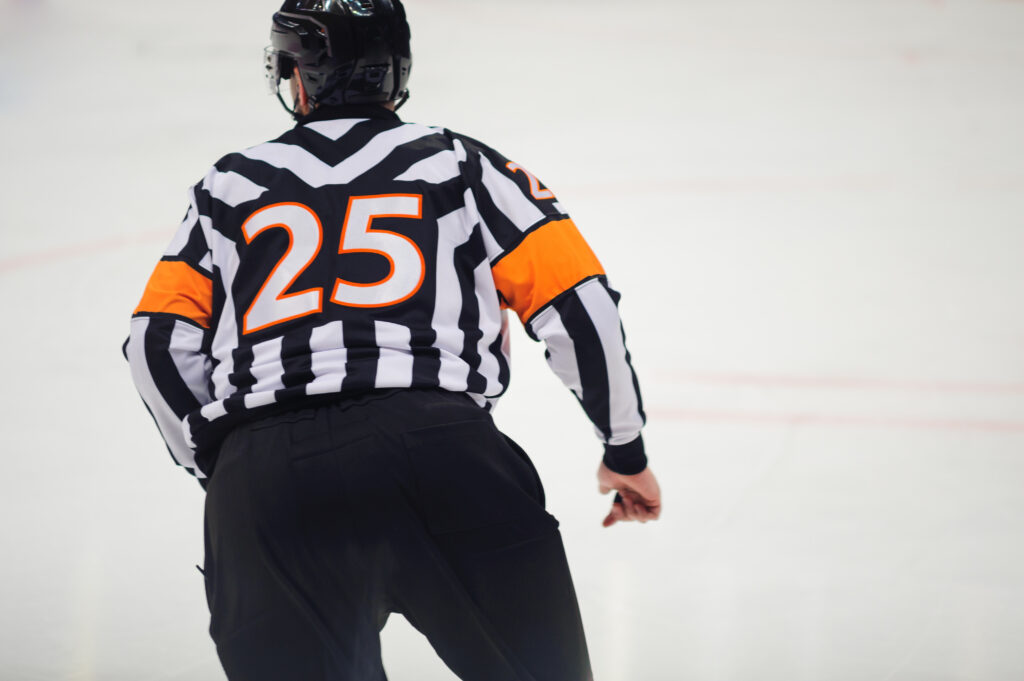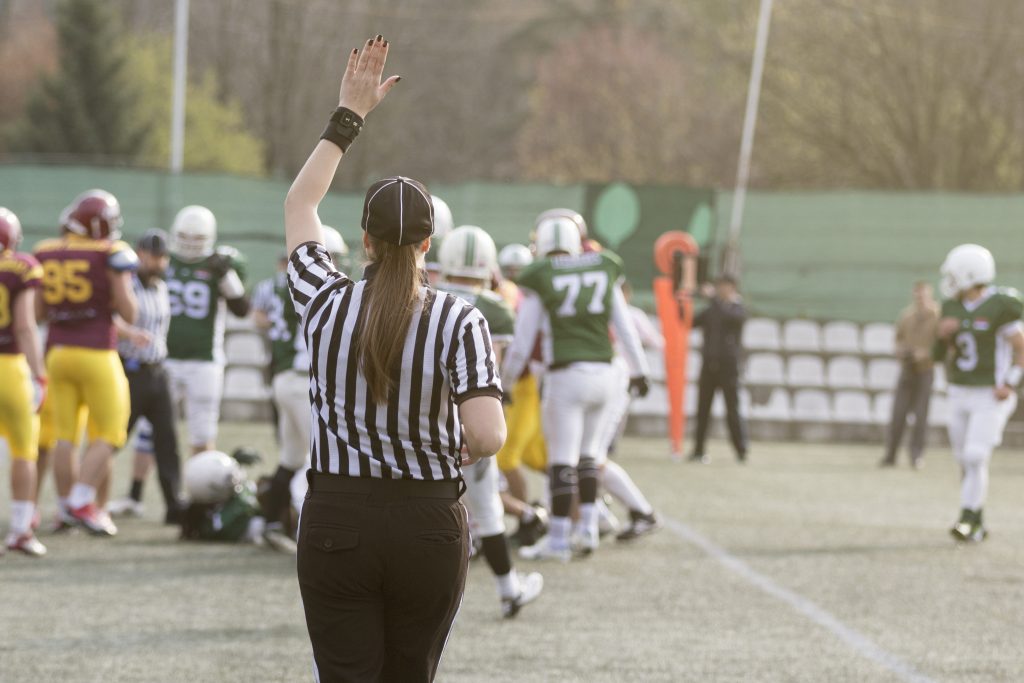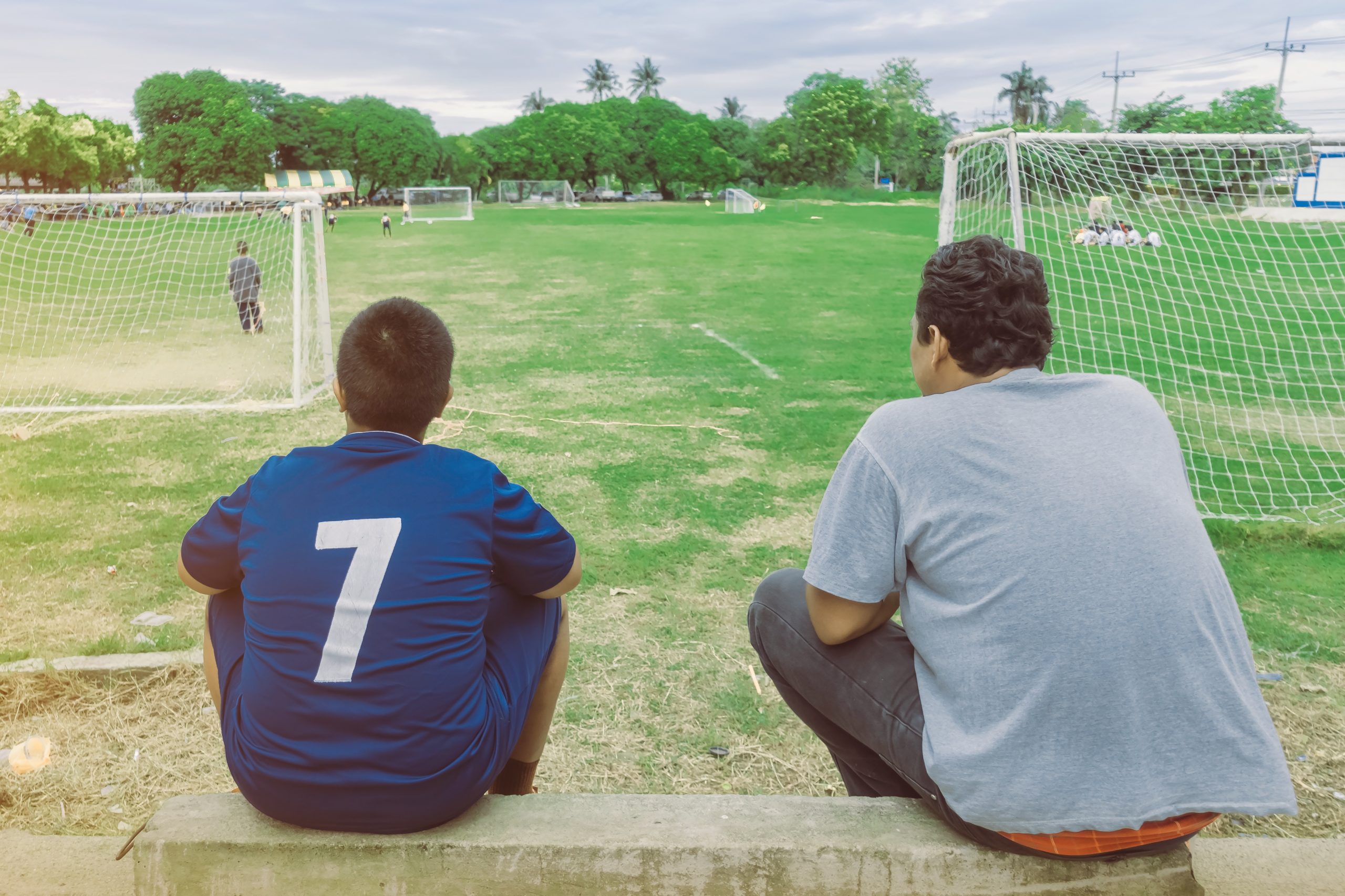Highlights
- The Canadian sport system is experiencing a steep decline in number of match officials due to a combination of factors including abuse, lack of support from organizations, and lack of compensation
- In this article, officials from various sports across the country share their perspectives on the officiating crisis, including potential solutions such as education programs for parents and spectators, signage, and mentorship programs for officials
- Parents in particular play a key role in modelling appropriate sideline behaviour, but are often part of the problem
“They’re not yelling at you. They’re yelling at your shirt,” is the refrain that Nicole Pagliaro, a Harassment Officer for the Huronia District Soccer Association, repeats to her young referees, so that they’re armed with mental defenses for dealing with abuse.
But fewer officials young and old are feeling like the positives of the job are worth the abuse and stressful environment. The COVID-19 pandemic further exacerbated the decline in officiating numbers. Now sports across Canada are facing an officiating crisis.
The match official shortage was frequently brought up during the Canadian Sport Policy renewal process as an urgent situation that requires the coordinated response of the entire sector. This article provides an overview of the cultural context of the officiating shortage in Canada and highlights the voices of match officials from across the nation.
Addressing a culture of abuse
Hockey Canada reported a decline from 33,000 down to 16,000 officials pre- versus post-pandemic (Fitz-Gerald, 2021). Ontario soccer is down from 8500 officials in 2019 to 4846 in 2022, with 2000 of those officials being brand new (Fitz-Gerald, 2022).

While cross-sport research on officials in Canada is lacking, research from the United States shows that in a survey of 19,000 sport officials, 70% ranked “love of the sport” as their primary reason for officiating, but 55% ranked verbal abuse as the number one reason for quitting (IUPUI, 2022). The survey also showed that 59% of officials don’t feel respected by parents or spectators, and 42% feel that the organizations they work with don’t do enough to address toxic behaviours (IUPUI, 2022).
Pagliaro, who is also part of the Match Official Development Committee for Ontario Soccer, says that older, more seasoned referees found that they were enjoying a break from the abuse during the pandemic and had little incentive to return. The pandemic also meant that opportunities for mentorship and development of younger officials were put on hold.
David Hancock, a professor in the School of Human Kinetics and Recreation at Memorial University, Newfoundland who studies officials, has a slightly different explanation. “It’s easy to say that the abuse is the reason why [officials] drop out, but someone who receives abuse and has proper support within their organization isn’t really likely to drop out,” he explains. “They’re more likely to drop out from other demands like lack of compensation and the stress of the job itself.”
Basketball official and former Manager of Officials for Basketball BC, Brooke Briscoe, has faced these intertwining issues: “Most of us adult officials have full time jobs. We’re not reffing for the pay, we’re doing it because we love the sport. Games are usually Friday and Saturday nights, so we’ve usually worked all week, battled traffic to get to the gym an hour early, just to get yelled and sworn at, and then spend an hour or two after the game debriefing and analyzing clips, trying to get better.”
Rhonda Pauls, Executive Director of Baseball PEI says she understands why youth aren’t flocking to sign up for officiating gigs. “[We have] this culture of ridiculous abuse and entitlement of coaches and fans who are complaining and insulting to officials. And in the age of the video camera, people tell officials ‘We’re going to be videoing you and watching you and we’re going to post it on social media when you make a mistake and we’re going to mock you and criticize you and blame you.’ Who wants to sign up for that?”
Pagliaro is a bit more light-hearted. “I started refereeing because I had an injury playing and didn’t want to get hurt again but wanted to remain part of the game. I like to joke around now that since I became a referee, the only thing that gets hurt are my feelings.”
Capacity for mentorship
Through the Canadian Sport Policy renewal process, Canadians were able to provide their input regarding their vision for the future of sport in Canada. As part of the process, officials and administrators asserted the importance of mentorship programs to help officials navigate abuse, work on improving their skills, and feel a part of a connected community.

For Briscoe, a mentorship program in Edmonton was crucial to her continuation as a referee. “Mentorship is constantly talked about, but that’s because it’s so important. It’s integral to helping officials feel like they belong, feel supported, and to develop.” When Briscoe was a mentee, senior officials who wished to get assigned to high-level games or championships were required to participate in the mentorship program. Thus, mentorship was ingrained in the development structure.
But when there’s already not enough officials to cover games, finding extras to stand on the sides to observe, support, and debrief with the acting official feels like a pipe dream to many organizations.
“What people don’t have any more is the manpower to oversee programming,” Pauls notes. “We don’t have paid staff at the organizational level these days, it’s all volunteers. And they already have the pressure of being asked, ‘Can you please umpire this game, can you please run this program, please give this feedback, please do this paperwork, please drive three hours to this place because we have nobody to cover it, just so that you can get disrespected while you’re there…”
Hancock notes that recruitment and retention efforts (such as mentorship programs) targeted at diversifying official cohorts are key. “Not enough sport organizations are doing anything to recruit people who might not be white men. In your traditional team sports, only about 10% of officials are female. If you want to overcome the officiating shortage, and you can increase that to 30%, you’d be making headway.”
But women and racialized officials are at more risk for sexist and racist abuse.
This fact aligns with broader calls from participants and stakeholders in the Canadian Sport Policy renewal process for increased anti-racism training and diversity efforts across sport organizations.
Pagliaro is still baffled by the ways that gender shows up on the field. “Spectators will yell at players to listen to the ‘lady ref,’” she says. “And I’m thinking, why are we adding the ‘lady’ to the front?”
The role of parents
Parents have a key role to play in modeling respectful sideline behaviour but are often part of the problem. For this reason, Pagliaro finds the youth matches tricky to navigate.
“I find the younger the age group, the more erratic the spectators are,” she explains. “I went to an under-12 festival this past weekend. It was the very first game of the morning. We were short referees. We didn’t have enough to cover the games. So, we were overextending ourselves as it was. The very first game that I had, there was an offside call and I didn’t have a good look at it. The whole one side stood up and was yelling and me.”

So Pagliaro addressed the spectators directly. “I walked over and I said to them: ‘the number one reason that we have a match official shortage in the province of Ontario today is because of abuse. I am here today. Our team is covering 47 matches today and we were doing it without assistant referees because we couldn’t get enough to come out. I appreciate your support. I will make good calls and I will miss some calls. But I need you to understand we are trying our best here today. Please let’s work together.’”
Match officials are trained not to speak to parents, as players and coaches, not parents, are their responsibility. The normal chain of engagement would be a referee would speak to the coach about a spectator or parent who is out of line, and the coach speaks to them.
But on that day, Pagliaro felt it was important that the spectators know where she was coming from. And the spectators responded in kind: “I had parents clapping and yelling ‘Yeah ref!’”
Both Colin Cameron, Head Referee at Milton Youth Soccer, and Pauls fell into (or back into) officiating because of their roles as parents. Cameron started refereeing as a teenager but stopped when he went to university because there was no opportunity for progression. 25 years later, he took the training again, this time with his eldest child, partly out of love of the game, and partly out of a desire to protect his son: “I remembered the difficult parts [about reffing] from when I was starting out as a teenager. There was part of me as a parent that wanted to be there as my son.”
Pauls’ officiating career started by mistake, when no official showed up for one of her kid’s baseball games, so she umpired the game herself. She then progressed all the way up to international officiating and involvement with Baseball Canada.
Being both parents and officials gives Cameron and Pauls a lens to talk to other parents about interacting with match officials.
“I was watching one of our young referees and the parent of the referee came up to me,” Cameron says. “She said, ‘You know, Colin, watching my daughter referee has changed me. I used to be the parent that screamed at the referee for that mistake. Now, all I can do when I look at the referee and I want to scream is think of my daughters. Now I’m telling the other parents as they’re getting angry to just shut up.’ One of her close friends in the parent circle said to her, ‘You’ve changed. What’s going on?’ And she said, ‘You have no idea what it’s like to be a ref.’”
The way forward
There are existing programs that seek to address officiating abuse, but there’s still a long way to improve the number and experiences of sport officials in Canada.
For example, you may have seen first-year officials or referees under the age of 18 wearing a coloured armband or shirt to identify them as “in-training.” While it’s a good idea to try and protect vulnerable officials, initiatives like these can have unintended consequences.
“Europe’s been doing that for a couple of years now, and what they seem to be finding is that it lessens the abuse a little bit toward minors, but it’s increasing abuse for other people,” Hancock explains. “If you’re 18 plus a day, you don’t get to wear the green armband anymore. And now your abuse is a little higher than it would have been before the program was in place.”
Here in Canada, Sport Manitoba initiated a “No Ref, No Game” campaign in 2020 to draw attention to maltreatment of officials. The campaign gained traction, with many media outlets reaching out, interested in spreading the word about the need to respect match officials. In 2021, Sport Manitoba pivoted the #NoRefNoGame campaign to focus on recruitment of officials.
Signage around fields, courts, and rinks, reminding patrons to be respectful of match officials is also helpful. In engagement sessions for the Canadian Sport Policy renewal, officials also suggested the creation of a National Officials Association, like the Coaching Association of Canada, to provide a singular hub for support, training, and information.
Many officials point to coaches, alongside parents, as key players in combatting abuse of officials.
“Back when I played high school hockey, decades ago, I had a coach who told us, ‘You say nothing to the referee other than, ‘hey, how’s it going?’” Hancock says. “If you were rude to the ref, you sat the rest of the game. None of us ever complained. We need coaches to take leadership on this to change the culture.”
Hancock often does workshops with athletes as well: “I ask them, ‘How many mistakes does your team make per game?’ And they say, ‘I don’t know, maybe 50?’ And then I ask them, ‘How many does the referee make?’ If the ref is having a really bad game, it’s maybe 10. So don’t hyperfocus on that one person’s set of mistakes more than your own team’s.”
Many organizations have codes of conduct already, but the problem is usually with enforcement, or lack of clarity regarding exactly what crosses the line into the range of the unacceptable. Having representatives from sport organizations attend events and reprimand abusive spectators could be helpful, but again, volunteer-run organizations are already stretched thin on human resources.
“Look at the Safe Sport push that we’re in and all the training that people have to undergo to be a coach or official that works with youth,” Pauls notes. “The need for a safe sport environment for officials, including but not limited to youth officials, hasn’t been emphasized.”
The bottom line is that sport organizations, parents, coaches, and athletes need to work together with officials to address abuse. As Briscoe described it: “The decline in officiating numbers isn’t an officials problem. It’s a sport culture problem.”
And unfortunately, the problem is only going to get worse. According to a survey of officials by Officially Human (2022), a U.S.-based organization dedicated to ensuring respect and positive treatment of sport officials, 50% of officials are 55 years or older, and only 12% are under 34 years old. In addition, 45% report that they have less than 6 years of officiating remaining.
While these numbers are American, Hancock cautions that Canada is in a similar situation: “We’re only seeing the tip of the iceberg here.”
As Sport Manitoba’s “No Ref No Game” campaign encapsulates, match officials are crucial for the Canadian sport system to operate. Sport organizations, parents, athletes and spectators will put their own sporting experiences at risk if they fail to address the issues that match officials face with regard to abuse, support, and compensation.